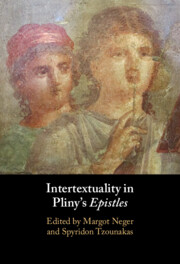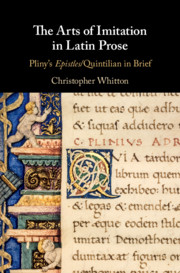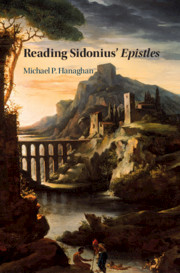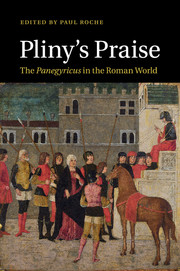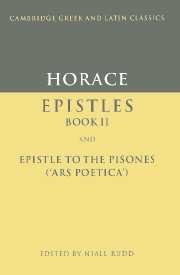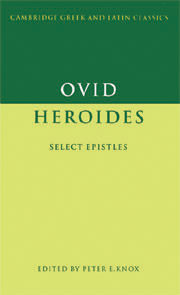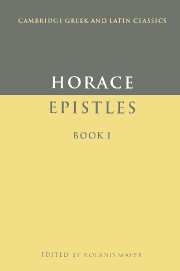Intertextuality in Pliny's Epistles
- Editors:
- Margot Neger, University of Cyprus
- Spyridon Tzounakas, University of Cyprus
- Date Published: September 2023
- availability: This ISBN is for an eBook version which is distributed on our behalf by a third party.
- format: Adobe eBook Reader
- isbn: 9781009294782
Find out more about Cambridge eBooks
Adobe eBook Reader
Other available formats:
Hardback
Looking for an examination copy?
This title is not currently available for examination. However, if you are interested in the title for your course we can consider offering an examination copy. To register your interest please contact [email protected] providing details of the course you are teaching.
-
Pliny's Epistles are full of literary artistry. This volume of essays by an impressive international team of scholars showcases this by exploring the intertextual, interdiscursive and also intermedial character of the collection. It provides a contribution to the recent scholarly interest in Latin prose intertextuality and in the literary and cultural interactions of the Imperial period. Focusing on the whole collection as well as on single books and selected letters, it investigates Pliny's strategies of incorporating literary models and genres into his epistolary oeuvre, thus creating a kind of 'super-genre' himself. In addition to displaying Pliny's literary techniques, the volume also serves as an advanced introduction to Latin prose poetics.
Read more- Explores the intertextuality and interdiscursive character of Pliny the Younger's Letters through in-depth case studies
- Demonstrates the generic flexibility of ancient epistolography which can absorb a plurality of literary and non-literary genres and texts
- Essential for those generally interested in epistolography and prose-intertextuality
Customer reviews
Not yet reviewed
Be the first to review
Review was not posted due to profanity
×Product details
- Date Published: September 2023
- format: Adobe eBook Reader
- isbn: 9781009294782
- availability: This ISBN is for an eBook version which is distributed on our behalf by a third party.
Table of Contents
Introduction Margot Neger and Spyridon Tzounakas
Part I. Intertextuality and Interdiscursivity in Pliny's Letters:
1. Pliny, Man of Many Parts (Lucretius, Cicero, Valerius Maximus, Tacitus) Christopher Whitton
2. Intertextuality in Pliny Epistles 6 Roy Gibson
3. Discourses of Authority in Pliny, Epistles 10 Alice König
Part II. Models and Anti-Models: Pliny's Interaction with Oratory and Natural History
4. Oratorical Speeches and the Political Elite in the Regulus Cycle Matthew Mordue
5. Again on Corinthian Bronzes and Vases and on the Use of Cicero's Verrine Orations in Pliny's Works Stefano Rocchi
6. The Elder Pliny as source of inspiration: Pliny the Younger's reception of the Naturalis Historia and his uncle's writing by the light of a lamp (lucubratio) Judith Hindermann
Part III. Pliny and Seneca: Discourses of Grief and Posthumous Reputation
7. Pliny's Seneca and the Intertextuality of Grief Michael Hanaghan
8. Intertextuality and Posthumous Reputation in Pliny's Letter on the Death of Silius Italicus (Plin. Ep. 3.7) Spyridon Tzounakas
Part IV. Pliny's Villas and their Poetic Models:
9. The Villa and the Monument: Horace in Plin. Ep. 1.3 Alberto Canobbio
10. The Villas of Pliny and Statius Christopher Chinn
Part V. Pliny Turns Nasty: Satire and the Scoptic Tradition
11. A Busy Day in Rome: Pliny Ep. 1.9 Satirized by Horace Sat. 1.9 Ábel Tamás
12. Putting Pallas out of Context: Pliny on the Roman Senate voting Honours to a Freedman (Ep. 7.29 and 8.6) Jakub Pigoń
13. Risus et indignatio: Scoptic Elements in Pliny's Letters Margot Neger
Part VI. Final Thoughts: Discourses of Representation and Reproduction
14. Pliny's Calpurnia: Filiation, Imitation, Allusion Ilaria Marchesi.
Sorry, this resource is locked
Please register or sign in to request access. If you are having problems accessing these resources please email [email protected]
Register Sign in» Proceed
You are now leaving the Cambridge University Press website. Your eBook purchase and download will be completed by our partner www.ebooks.com. Please see the permission section of the www.ebooks.com catalogue page for details of the print & copy limits on our eBooks.
Continue ×Are you sure you want to delete your account?
This cannot be undone.
Thank you for your feedback which will help us improve our service.
If you requested a response, we will make sure to get back to you shortly.
×
